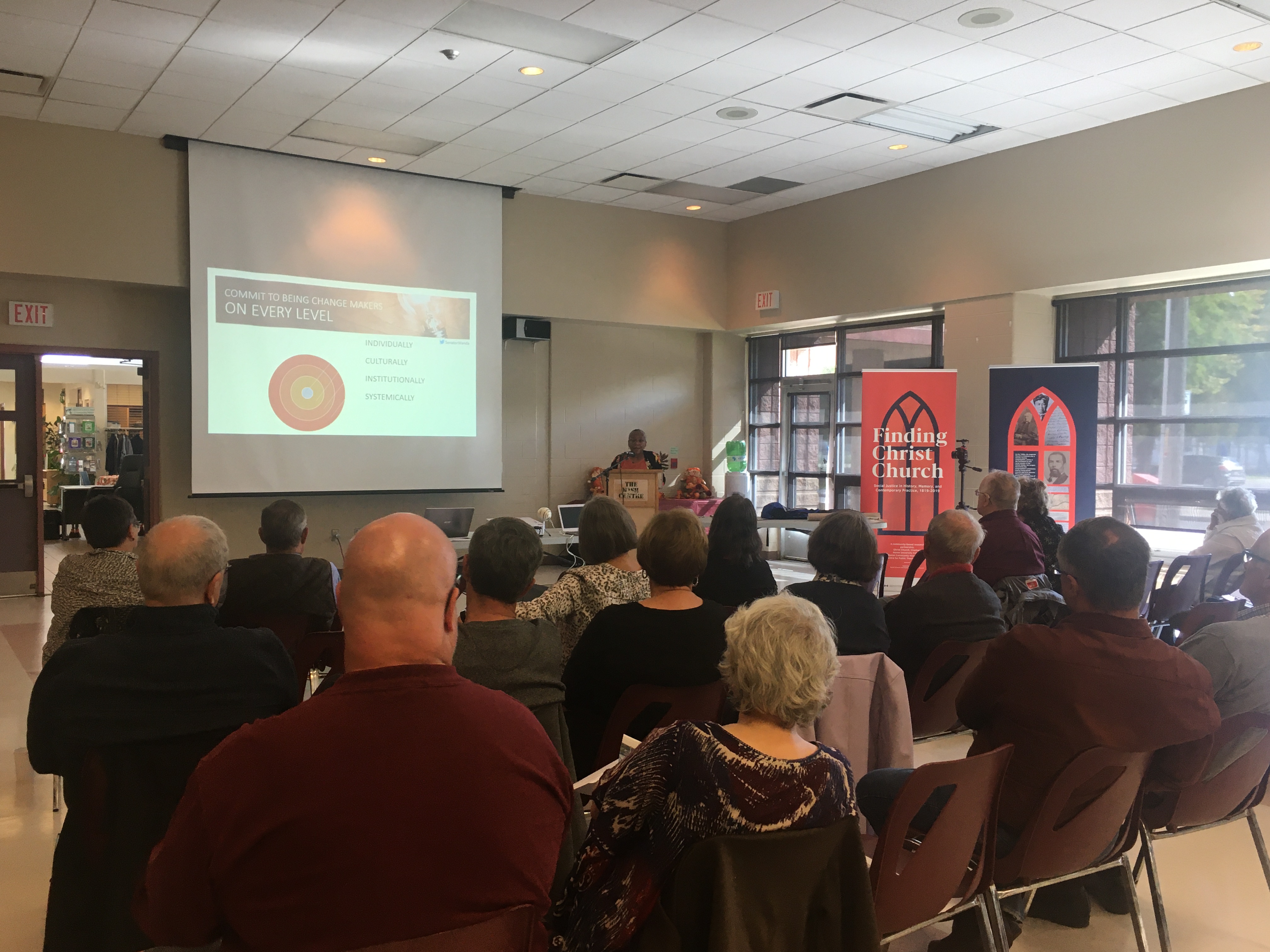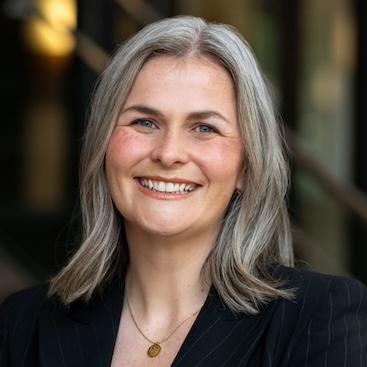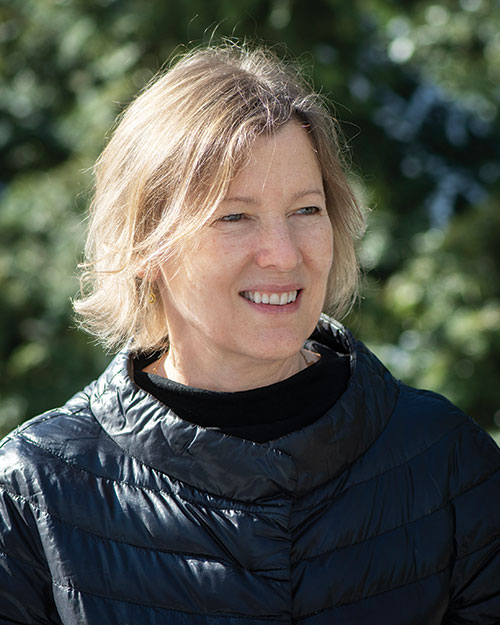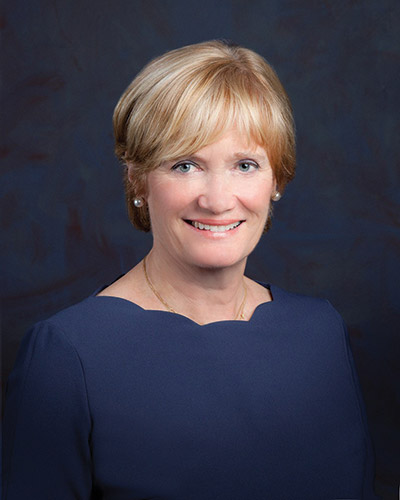If we are not acknowledging our history, we are not acknowledging the conditions that got us to the present.
In November 2018, Christ Church in Chatham partnered with researchers from Huron University College on a joint project commemorating 200 years of the Anglican church’s presence in the Chatham-Kent area. The project, “Finding Christ Church: Social Justice in history, memory, and contemporary practice, 1819-2019,” was led by Drs. Nina Reid-Maroney, Gary Badcock, and Amy Bell, and was made possible through a federal grant from the Social Science and Humanities Research Council (SSHRC).
This project is focused on learning how Christ Church, one of the oldest Anglican churches between Niagara-on-the-Lake and the Pacific Ocean, was involved in histories of civil rights activism and racial segregation, contributing to the conception of Ontario’s Human Rights Legislation. A feature in the Chatham Daily News described the project as focusing on the 19th-century history of the church, when “the local Anglican church used its public platform and resources to support the movement to end slavery in the United States and to speak out for racial equality in partnership with the black abolitionists and freedom seekers.” Christ Church Rector, Rev. John Maroney, described the project as “a chance to look at the past, while focusing on the future.”
 Huron undergraduates participating in the project were able to learn more about Christ Church’s history and civil rights activism through workshops and a living library event in Chatham. The living library, depicted by Dr. Nina Reid-Maroney as a way of “connecting to a living memory” allowed students to participate in one-on-one conversations with members of Christ Church in order to learn more about them and their past, and to hear their stories. Researchers also conducted interviews with community and church members, and completed archival work exploring the history of the church and civil rights engagement in the Chatham area. Differing accounts of the past emerged from this work, revealing the complexity of institutional and individual memories. For some, segregation was regarded as a problem that happened elsewhere, outside of Chatham; for others, anti-black racism was remembered as a significant part of Chatham’s 20th-century past.
Huron undergraduates participating in the project were able to learn more about Christ Church’s history and civil rights activism through workshops and a living library event in Chatham. The living library, depicted by Dr. Nina Reid-Maroney as a way of “connecting to a living memory” allowed students to participate in one-on-one conversations with members of Christ Church in order to learn more about them and their past, and to hear their stories. Researchers also conducted interviews with community and church members, and completed archival work exploring the history of the church and civil rights engagement in the Chatham area. Differing accounts of the past emerged from this work, revealing the complexity of institutional and individual memories. For some, segregation was regarded as a problem that happened elsewhere, outside of Chatham; for others, anti-black racism was remembered as a significant part of Chatham’s 20th-century past.
At the final community event for the project, Senator Wanda Thomas Bernard presented a keynote address acknowledging the activist roots of Christ Church, and encouraging members of the congregation and wider community to return to these roots rather than becoming bystanders to current forms of racism and other forms of exclusion. She recognized the role of the project in helping to make visible the importance of the church as a place of constructive dialogue and conversation, and providing an example of how finding the courage to look back allows us to look forward to the future.
This joint research project demonstrates the relevance and importance of community-engaged research in our communities, workplaces, and institutions. The “Finding Christ Church” research project serves as an example of how research can lead to social change, support advocacy and social justice work within local communities.
To learn more about the Finding Christ Church project please visit: http://www.huronresearch.ca/findingchristchurch/






 Lisa Jones Keenan is the Vice President of Sales at Xplornet Communications, the largest rural fixed wireless broadband service provider in Canada.
Lisa Jones Keenan is the Vice President of Sales at Xplornet Communications, the largest rural fixed wireless broadband service provider in Canada. 
 Leigh Allen is the AVP, Global Strategic Research, Reinsurance Group of America Inc., one of the world’s largest global life and reinsurance companies.
Leigh Allen is the AVP, Global Strategic Research, Reinsurance Group of America Inc., one of the world’s largest global life and reinsurance companies. Yola Ventresca is a Managing Partner, Lerners LLP, Secretary of Huron’s Board of Governors and a Huron Class of ’02 alumni. Selected as one of Canada’s “Best Lawyers,” she is passionate about the value of Liberal Arts in helping students succeed in their careers.
Yola Ventresca is a Managing Partner, Lerners LLP, Secretary of Huron’s Board of Governors and a Huron Class of ’02 alumni. Selected as one of Canada’s “Best Lawyers,” she is passionate about the value of Liberal Arts in helping students succeed in their careers. Susan Farrow is an Assistant Professor in The Temerty Faculty of Medicine at the University of Toronto and a Founding Partner and Co-Director of The Toronto Institute of Group Studies, an organization offering certified training and education in group leadership.
Susan Farrow is an Assistant Professor in The Temerty Faculty of Medicine at the University of Toronto and a Founding Partner and Co-Director of The Toronto Institute of Group Studies, an organization offering certified training and education in group leadership.  Frank Holmes is CEO and Chief Investment Officer of U.S. Global Investors, as well as a business commentator, philanthropist and Huron Class of ‘78 alumnus. Holmes also serves as the Executive Chairman of HIVE Blockchain Technologies, the first cryptocurrency mining company to go public in 2017.
Frank Holmes is CEO and Chief Investment Officer of U.S. Global Investors, as well as a business commentator, philanthropist and Huron Class of ‘78 alumnus. Holmes also serves as the Executive Chairman of HIVE Blockchain Technologies, the first cryptocurrency mining company to go public in 2017. Kelly Meighen is an experienced philanthropist and volunteer. In her role as president of the T.R. Meighen Family Foundation, she has created a legacy of volunteerism and philanthropic giving in the areas of youth mental health advocacy, environmental conservation and cultural vibrancy.
Kelly Meighen is an experienced philanthropist and volunteer. In her role as president of the T.R. Meighen Family Foundation, she has created a legacy of volunteerism and philanthropic giving in the areas of youth mental health advocacy, environmental conservation and cultural vibrancy.  Ranjita is Executive Chair of the Oxford Global Partnership, advising investors, businesses, family offices and entrepreneurs on sustainable, inclusive and responsible value creation. A Business Fellow at Oxford University’s Smith School, Ranjita engages with companies on pursuing value with values, and teaches a postgraduate “Essentials of ESG & DEI” course.
Ranjita is Executive Chair of the Oxford Global Partnership, advising investors, businesses, family offices and entrepreneurs on sustainable, inclusive and responsible value creation. A Business Fellow at Oxford University’s Smith School, Ranjita engages with companies on pursuing value with values, and teaches a postgraduate “Essentials of ESG & DEI” course. Caleb Hayhoe is the Founder & Chairman of Flowerdale Group and a Huron Class of ’85 Alumnus. Flowerdale Group is a Hong Kong based family office with a global investment outlook across public markets, real estate and private investment. Hayhoe previously spent over ten years building a global sourcing business together with an exceptional team, and remains committed to entrepreneurialism and helping great ideas become sustainable companies.
Caleb Hayhoe is the Founder & Chairman of Flowerdale Group and a Huron Class of ’85 Alumnus. Flowerdale Group is a Hong Kong based family office with a global investment outlook across public markets, real estate and private investment. Hayhoe previously spent over ten years building a global sourcing business together with an exceptional team, and remains committed to entrepreneurialism and helping great ideas become sustainable companies.



